#Dmitri Jurowski
Explore tagged Tumblr posts
Text
Opera on YouTube 3
Il Barbiere di Siviglia (The Barber of Seville)
Mario Lanfrachi studio film, 1965 (Sesto Bruscantini, Valeria Mariconda, Ugo Benelli; conducted by Alberto Zedda; no subtitles)
Jean-Pierre Ponnelle studio film, 1974 (Hermann Prey, Teresa Berganza, Luigi Alva; conducted by Claudio Abbado; English subtitles)
New York City Opera, 1976 (Alan Titus, Beverly Sills, Henry Price; conducted by Sarah Caldwell; English subtitles)
Arena Sferisterio, 1980 (Leo Nucci, Marilyn Horne, Ernesto Palacio; conducted by Nicola Rescingo; no subtitles)
Teatro Real de Madrid, 2005 (Pietro Spagnoli, Maria Bayo, Juan Diego Flórez; conducted by Gianluigi Gelmetti; Arabic subtitles)
Teatro la Fenice, 2008 (Roberto Frontali, Rinat Shaham, Francesco Meli; conducted by Antonino Fogliani; Italian subtitles)
Royal Opera House, Covent Garden, 2009 (Pietro Spagnoli, Joyce DiDonato, Juan Diego Flórez; conducted by Antonio Pappano; English subtitles)
Vienna State Opera, 2019 (Rafael Fingerlos, Margarita Gritskova, Juan Diego Flórez; conducted by Evelino Pidó; English subtitles)
Arena di Verona, 2022 (Leo Nucci, Nino Machaidze, Dmitry Korchak; conducted by Daniel Oren; English subtitles)
Garsington Opera, 2023 (Johannes Kamler, Katie Bray, Andrew Stenson; conducted by Douglas Boyd; English subtitles)
Rigoletto
Wolfgang Nagel studio film, 1977 (Rolando Panerai, Franco Bonisolli, Margherita Rinaldi; conducted by Francesco Molinari-Pradelli; Japanese subtitles)
Metropolitan Opera, 1977 (Cornell MacNeil, Plácido Domingo, Ileana Cotrubas; conducted by James Levine; no subtitles)
Metropolitan Opera, 1981 (Cornell MacNeil, Luciano Pavarotti, Christiane Eda-Pierre; conducted by James Levine; no subtitles)
Jean-Pierre Ponnelle film, 1982 (Ingvar Wixell, Luciano Pavarotti, Edita Gruberova; conducted by Riccardo Chailly, English subtitles)
English National Opera, 1982 (John Rawnsley, Arthur Davies, Marie McLaughlin; conducted by Mark Elder, sung in English)
La Monnaie, Brussels, 1999 (Anthony Michaels-Moore, Marcelo Álvarez, Elizabeth Futral; conducted by Vladimir Jurowski; no subtitles)
Arena di Verona, 2001 (Leo Nucci, Aquiles Machado, Inva Mula; conducted by Marcello Viotti; Italian subtitles)
Zürich Opera house, 2006 (Leo Nucci, Piotr Beczala, Elena Mosuc; conducted by Nello Santi; no subtitles)
Paris Opera, 2016 (Quinn Kelsey, Michael Fabiano, Olga Peretyatko; conducted by Nicola Luisotti; English subtitles)
Teatro Massimo, 2018 (George Petean, Ivan Ayon Rivas, Grazia Schiavo; conducted by Stefano Ranzani; English subtitles)
Così Fan Tutte
Vaclav Kaslik studio film, 1969 (Gundula Janowitz, Christa Ludwig, Luigi Alva, Hermann Prey; conducted by Karl Böhm; English subtitles)
Jean-Pierre Ponnelle studio film, 1988 (Edita Gruberova, Delores Ziegler, Luis Lima, Ferruccio Furlanetto; conducted by Nikolaus Harnoncourt; English subtitles) – Act I, Act II
Teatro alla Scala, 1989 (Daniela Dessì, Delores Ziegler, Josef Kundlak, Alessandro Corbelli; conducted by Riccardo Muti; Italian subtitles) – Act I, Act II
Théâtre du Châtelet, 1992 (Amanda Roocroft, Rosa Mannion, Rainer Trost, Rodney Gilfry; conducted by John Eliot Gardiner; English subtitles)
Vienna State Opera, 1996 (Barbara Frittoli, Angelika Kirschlager, Michael Schade, Bo Skovhus; conducted by Riccardo Muti; English and Italian subtitles)
Teatro Comunale di Ferrara, 2000 (Melanie Diener, Anna Caterina Antonacci, Charles Workman, Nicola Ulivieri; conducted by Claudio Abbado; no subtitles)
Zürich Opera House, 2000 (Cecilia Bartoli, Liliana Nikiteanu, Roberto Saccá, Oliver Widmer; conducted by Nikolaus Harnoncourt; no subtitles) – Act I, Act II
Opera Lyon, 2007 (Maria Bengtsson, Tove Dahlberg, Daniel Behle, Vito Priante; conducted by Stefano Montanari; French subtitles)
Salzburg Festival, 2009 (Miah Persson, Isabel Leonard, Topi Lehtipuu, Florian Boesch; conducted by Adam Fischer; English subtitles)
Zürich Opera House, 2009 (Malin Hartelius, Anna Bonitatibus, Javier Camarena, Ruben Drole; conducted by Frans Welser-Möst; English subtitles)
Aïda
San Francisco Opera, 1981 (Margaret Price, Luciano Pavarotti; conducted by Luis Garcia Navarro; no subtitles)
Metropolitan Opera, 1985 (Leontyne Price, James McCracken; conducted by James Levine; English subtitles) – Act I, Act II, Act III, Act IV
Teatro alla Scala, 1986 (Maria Chiara, Luciano Pavarotti; conducted by Lorin Maazel; English subtitles)
Metropolitan Opera, 1989 (Aprile Millo, Plácido Domingo; conducted by James Levine; English subtitles)
Teatro Comunale di Busseto, 2001 (Adina Aaron, Scott Piper; conducted by Massimiliano Stefaneli; Italian subtitles)
St. Margarethen Opera Festival, 2004 (Eszter Szümegi, Konstantin Andreev; conducted by Ernst Marzendorfer; English subtitles)
Metropolitan Opera, 2012 (Liudmyla Monastyrska, Roberto Alagna; conducted by Fabio Luisi; Russian subtitles)
Tbisili State Opera, 2017 (Maqvala Aspanidze, Franco Tenelli; conducted by Marco Boemi; Russian subtitles)
Teatro Colón, 2018 (Latonia Moore, Riccardo Massi; conducted by Carlos Vieu; Spanish subtitles)
Teatro la Fenice, 2019 (Roberta Mantegna, Francesco Meli; conducted by Riccardo Frizza; French subtitles)
#opera#youtube#complete performances#il barbiere di siviglia#rigoletto#così fan tutte#aida#gioachino rossini#giuseppe verdi#wolfgang amadeus mozart
20 notes
·
View notes
Text
LICEU 2021-2022: PIKOVAIA DAMA
LICEU 2021-2022: PIKOVAIA DAMA
Elena Zaremba i Yusif Eyvazov a Pikovaia Dama. Fotografia de ©A Bofill gentilesa del departament de Premsa del Gran Teatre del Liceu. La temporada es va iniciar amb una embranzida molt engrescadora i els dos darrers títols ens han posat de cop en la realitat més crua. La pandèmia que sembla que ha causat moltes baixes a l’orquestra amb les corresponents substitucions per altres músics, les…

View On WordPress
#Antoni Lliteres#Cor i Orquestra del Gran Teatre del Liceu#David Alegret#Dmitri Jurowski#Elena Zaremba#Gemma Coma-Alabert#Gilbert Defló#Ivo Stanchev#Lena Belkina#Lianna Haroutounian#Marc Sala#Mercedes Gancedo#Mireia Pintó#P.I.Txaikovski#Pikovaia Dama#Rodion Pogossov#Yusif Eyvazov#Łukasz Goliński
0 notes
Text
Top 7 albums right now!
tagged by @babinicz, thank you! This looks fun but I couldn’t make the top7albums-site work so y’all be getting a simple list from me:
Tchaikovsky: Eugene Onegin - Dmitri Hvorostovsky & Nuccia Focile & Neil Shicoff & Irina Arkhipova & Olga Borodina & Sarah Walker & St.Petersburg Chamber Choir & Orchestre de Paris & Semyon Bychkov
Prokofiev: Cinderella, Op. 87 - WDR Simfonieorkester Köln & Michail Jurowski
Hvorostovsky: In this moonlit night - Dmitri Hvorostovsky & Ivari Ilja
Rachmaninov: Romances - Dmirti Hvorostovsky & Ivari Ilja
Splendor & Misery - clipping.
Footnotes for the Spring - Eliza Rickman
Shostakovich: Symphonies Nos. 5 & 1 - London Symphony Orchestra & Gianandrea Noseda
Tagging: @klingonegin, @jimothy-norrington , and everyone else who sees this and wants to do it - consider yourself tagged!
#i added spotify links although i listen to very little on spotify#i own most of these on physical cds#tag game
6 notes
·
View notes
Photo

in harmony for @quilleth and the @7kppsecretsanta
a fic and playlist about dancing and falling in love; Elisabeth of Jiyel / Jasper of Vail Isle from Seven Kingdoms: The Princess Problem
Here and now, the two of them together in the ballroom with the light warm and golden as it poured through the windows, felt somehow momentous. Felt singular, despite all the other times they'd been alone, all the other times he'd met her here, instructed her.
Jasper knew it wasn't something that should make him feel so oddly breathless.
It was simply his duty.
She was his responsibility, his delegate, his charge, of course he would be honored.
Anything his lady required.
He would have done the same for anyone.
Had served before, would again; he knew his place.
More importantly he knew why, knew how necessary the Summit was, how vital the delegates, how every step, every word, every look would be judged.
She had to be prepared.
It was his job to always be prepared.
Why then did he feel as if he'd failed, as if he'd fallen, as if anything could happen next?
Why did the tension down his back feel so much like fear?
She had been a terrible dancer.
She wasn't now.
He'd always enjoyed a challenge.
That was all.
There was no other reason to want to smile, no other reason for the ache in his chest as he held it in, as he kept his face smooth, as he held himself precisely the proper distance away, as he kept each step steady.
He was not going to spin her around, lift her off her feet and listen for her laugh, was not going to display his joy in her success so overtly.
She is perfect.
There was nothing wrong with being pleased with one's delegate. Being proud of her.
With liking her.
It was satisfactory to have a charge of whom he could be so proud.
Proud of Ria's fine work, as well, how becomingly all that golden hair was swept up, the barest few tendrils to curl against the line of her neck...
No.
He was here to teach her to dance in preparation for the Matchmaker's Judgement, for the Ball.
Not to admire Ria's handiwork.
Not to admire her, not more than was proper.
It had been so straightforward when they first started, the basics of courtesy and curtsies; it was easy to remember his position, and hers. He was her servant; she'd requested his aid.
He would help, and then he would stand back to let her finish the Summit a success.
He'd never doubted her success.
But today he could feel her breathe, the lift of her ribs so close to his. He could feel the soft pressure of her hand, could smell the floral rinse Ria had made for her hair, could hear the soft whisper of her slippers against the floor as they turned, almost hidden beneath the slightly louder tap of his soles. Today he was close enough to count her eyelashes, to trace precisely the shape the shape of the shadows they cast against her cheeks, close enough to...
Today he didn't want to stand back.
He didn't want to let go.
He wanted the dance to last forever.
LISTEN ON: Spotify / YouTube / 8tracks
Pyotr Ilyich Tchaikovsky, State Academic Symphony Orchestra of Russia "Evgeny Svetlanov", Vladimir Jurowski - The Sleeping Beauty, Op. 66, TH 13, Act I "The Spell": No. 7, Entrée d'Aurore
Vitamin String Quartet - Howl’s Moving Castle - Merry-Go-Round of Life
Claude Bolling, Jean-Pierre Rampal, Max Hédiguer, Marcel Sabiani - Versatile, Pt. 1 - With Bass Flute
Aramis String Quartet - A Thousand Years
Emile Pandolfi - Once Upon a December (from Anastasia)
Dallas String Quartet - La Muerte Del Angel
2Cellos - Shape of My Heart
Apocalyptica - Nothing Else Matters
Dmitri Shostakovich, Russian State Symphony Orchestra, Dmitry Yablonsky - Jazz Suite No. 2: VI. Waltz 2
#7kppsecretsanta#7kpp#quilleth#elisabeth of jiyel#jasper of the isle#jilly writes#fanmix#jilly is bad at music#not really always but that's my tag?#sorry about that#happy holidays!
23 notes
·
View notes
Photo

Stasera si torna a Roma con Tosca. Grazie al M. Dmitri Jurowski #PucciniFestival #GiacomoPuccini #Pucciniintheworld #festivalpuccinintheworld #festivalpuccini #opera #musica #lirica #orchestra #pucciniano2019 #emotions #melodramma #regia #direction (presso Festival Puccini Torre del Lago) https://www.instagram.com/p/B1UHXGfIsDO/?igshid=17h9qjfyn7j4d
#puccinifestival#giacomopuccini#pucciniintheworld#festivalpuccinintheworld#festivalpuccini#opera#musica#lirica#orchestra#pucciniano2019#emotions#melodramma#regia#direction
0 notes
Text
Lope Hernan Chacón: Mussorgsky – Boris Godunov (Paris, 2018)
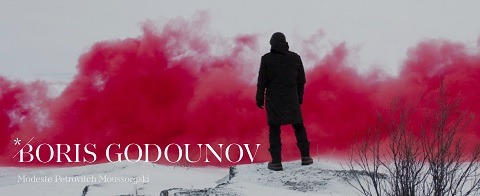
Modest Mussorgsky – Boris Godunov L’Opéra national de Paris, 2018
Vladimir Jurowski, Ivo van Hove, Ildar Abdrazakov, Evdokia Malevskaya, Ruzan Mantashyan, Alexandra Durseneva, Maxim Paster, Boris Pinkhasovich, Ain Anger, Dmitry Golovnin, Evgeny Nikitin, Peter Bronder, Elena Manistina, Vasily Efimov, Mikhail Timoshenko, Maxim Mikhailov, Luca Sannai
Culturebox – 7 June 2018
There’s a sense of the epic in Mussorgsky’s Boris Godunov that is entirely in keeping with the importance of the period in Russian history and with the nature of the Russian characteristics displayed in it. What is also essential about Mussorgsky’s epic vision for the work is its ability not just to capture a sense intimacy and personal conflict within that historical drama – a common enough characteristic in opera – but how he is able to make those personal sentiments just as grand and epic without losing their human character. Mussorgsky takes human sentiments of sadness, regret, guilt and internal conflict and gives them a Macbeth-like Shakespearean depth and complexity on a scale that befits their importance.
You get a sense of that right from the start in the opera, with the people of Russia calling out in chorus for him to be their new ruler. You also get a sense of how Boris feels about this from his very first line – “My soul grieves”. He has a heavy duty to perform to live up to the expectations of the Russian people and do them justice, but there is also a sense of guilt and remorse for the manner in which he comes to power, with rumours already accusing him of murdering the young Tsarevitch Dmitriy from the line of Ivan the Terrible to ascend to the throne. An accumulation of misfortune and other forces, including the rise of a Pretender to the throne in Lithuania, turns the people against Godunov, and the combined results strike the Tsar in deeply troubling ways. Finding a balance of scale between epic and intimate is one matter, but there is also the consideration of which version of Boris Godunov is the most authentic and effective in achieving the necessary impact. Historically it’s been the revised 1872 version that has been most commonly used, and understandably so as it contains many extensions to Mussorgsky’s brilliant score, but Rimsky-Korsakov’s reworking of the original materials has also been popular. Gradually however, we are seeing more productions of the original 1869 version, commonly with a few additions from the revised 1872 version that are deemed too good to be left out.
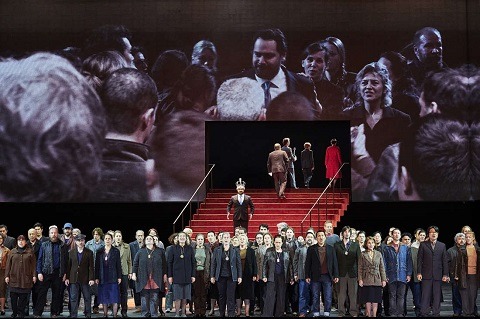
The 2018 Paris production however, directed by Ivo van Hove and conducted by Vladimir Jurowski, takes very much a purist approach by sticking to the complete 1869 original version of Boris Godunov, with no Polish Act nor any of the 1872 additions. It’s purist at least in musical terms, but clearly with the controversial Belgian theatre director Ivo van Hove involved in the project, it’s going to be anything but purist as far as the staging goes. That presents an intriguing team that should find a good balance between the grandly epic and the deeper underlying personal sentiments, and in many respects both sides of the work are well represented, but the production seems to be more effective for the choice of the stripped down force of the 1869 version than for anything that Jurowski or van Hove bring to the work.
As is usually the case with this director, Ivo van Hove relies on a minimal staging, abstract-modern with no period or historical trappings. The use of the space, opened up with back projections of the Russian people and landscapes that are mirrored to the sides, permits a sense of epic scale that can also close the work down to a more intimate level of intensity. A staircase is often present, leading up and also leading down beneath the stage, the symbolism of which is clearly apparent, representing rise and fall, and the separation of the ruling classes from the people. Other scenes are effectively austere, such as between Pimen and Grigoriy in the cell of the monastery in Chudov, needing no further elaboration than two people in near-darkness recounting events in words and divulging the thoughts that run through their minds.
How much of the success in getting this across is down to effective direction, how much is down to the musical performance and how much of this is simply down to the power of the story and Mussorgsky’s scoring of it is debatable, but it seems to me that it’s Mussorgsky’s score that does the bulk of the work. Even then Jurowski‘s conducting seems rather restrained and unfocussed, although it’s hard to judge fairly from an internet stream (I’ll be listening again more closely to the live radio broadcast on France Musique this weekend), and yet there’s no question that the drama and the dynamic is all there. Likewise Ivo van Hove doesn’t seem to bring much to an interpretation of the drama, but it doesn’t get in the way of it either.
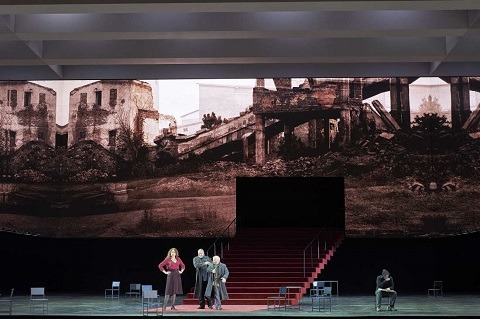
There are a few stylistic touches applied, but perhaps the only significant twist is at the conclusion. Not only does Boris Godunov finally and dramatically succumb to the pressures of family problems, famine blighting the country and growing instability in his mind over his murder of Dmitriy, but his son dies too at the hand of the Pretender Grigoriy. It’s a dark dramatic moment that doubles down on the music that Mussorgsky provides for this finale and, as Boris’s son’s reign was indeed cut short in deference to the False Dmitriy, it even effectively conveys the suggestion in Mussorgsky’s music that the conflict and turmoil of this historical period is far from over.
Ideally you want a Russian cast in Boris Godunov for maximum effectiveness, at least in the principal roles, and there’s little to find fault with in team assembled for the Paris production. Ildar Abdrazakov is perhaps a little too smooth and lacking the necessary depth and edge to get across the full conflict of Boris Godunov. He sings the role well, but there’s not enough emotion in the voice and too much overplaying in the acting to try to compensate for it. Ain Anger is an appropriately grave austere and occasionally ominous Pimen, there’s a similar good balance of restraint and gravity in Maxim Paster‘s Shuysky, and Vasily Efimov brings vocal colour and some hard truths as the Holy Fool. Lots to enjoy in the singing performances then, with strong a strong chorus combining to make a convincing case for the original 1869 version of Boris Godunov becoming the canonical version of this great work.
Links: L’Opéra de Paris, Culturebox
View Source
from WordPress https://ift.tt/2KnI3Yc via Ver Fuente
0 notes
Photo
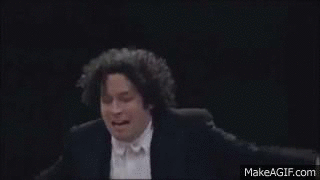
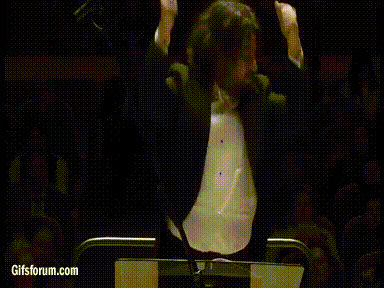

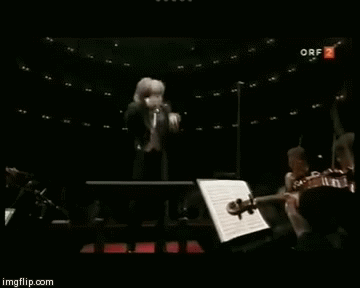
(put on metal music of your choice and enjoy)
#gustavo dudamel#dmitri jurowski#riccardo muti#seiji ozawa#classical music#orchestra#conductor#headbanging#epic conducting photos
2K notes
·
View notes
Video
youtube
Maurice Ravel- Tzigane, Violin: Maxim Vengerov, Conductor: Dmitri Jurowski
3 notes
·
View notes
Photo

Stasera si torna a Roma con Tosca. Grazie al M. Dmitri Jurowski #PucciniFestival #GiacomoPuccini #Pucciniintheworld #festivalpuccinintheworld #festivalpuccini #opera #musica #lirica #orchestra #pucciniano2019 #emotions #melodramma #regia #direction (presso Festival Puccini Torre del Lago) https://www.instagram.com/p/B1UHXGfIsDO/?igshid=17h9qjfyn7j4d
#puccinifestival#giacomopuccini#pucciniintheworld#festivalpuccinintheworld#festivalpuccini#opera#musica#lirica#orchestra#pucciniano2019#emotions#melodramma#regia#direction
0 notes
Text
Melanie Diner
Uliana Alexyuk
Cecelia Hall
Ksenia Antonova, Alexandra Kadurina, Nadezhda Gulitskaya
State Academic Symphony Orchestra “Evgeny Svetlanov” Vladimir Jurowski
L’estiu de 2013 Vladimir Jurowski signava una direcció esplèndida de Ariadne auf Naxos al Festival de Glyndebourne i ara hi torna però no amb la LSO sinó amb la State Academic Symphony Orchestra “Evgeny Svetlanov” i en aquesta fantàstica tenporada operística en forma de concert o millor seria dir semi-escenificada, que té lloc en la sala de concerts Txaikovski del Conservatori de Moscou i que a IFL n’hem conegut ja unes quantes.
El director rus continua meravellant per la claredat i intensitat d’una direcció càlida i enèrgica, extraient de l’orquestra tota l’opulència que Strauss és capaç d’oferir amb una formació de dimensions cambrístiques.
Alguns dels cantants que varen participar a Glyndeborune repetien a Moscou, el venerable mestre de música de Sir Thomas Allen o el Bacchus del tenor rus Sergey Skorokhodov, però la majoria, membres joves de la companyia del Bolshoi són nous. Ara bé hi ha una aportació nord-americana notabilíssima, la de la mezzosoprano Cecelia Hall que per a mi ha estat tota una revelació que caldrà seguir, perquè el seu compositor és el millor de la representació.
La soprano alemanya Melanie Diener és Ariadne. Conserva la veu per cantar el rol però hi ha moments que sembla al l��mit i no ho passa del tot bé. El final de “Es gibt ein Reich” és especialment dolorós, al límit del desastre, però ho supera i encara és capaç de d’arribar amb dignitat a l’extenuant duet final.
Sergey Skorokhodov i Uliana Alexyuk superen el repte de Bacchus i Zerbinetta sense commoure, ell perquè és difícil que en aquest rol cap tenor pugui arribat a trasbalsar (Kaufmann a Salzburg és el millor que jo recordo), més aviat estem pendents que acabi sense defallir, mentre que Alexyuk que ja va ser la Sophie d’aquell Werther sorprenent, fa totes les notes però sense la transcendència de les grandioses Zerbinetta que en aquest cas si que coneixem amb escreix. Ella no, compleix bé però sense aquella mestrívola solvència i desvergonyiment que tota soprano coloratura ha de tenir per oferir un impactant “Großmächtige Prinzessin”.
Magnífiques les tres nimfes, així com els components de la commedia dell’arte, tots cantants molt joves i amb unes carreres esplèndides per endavant, esperem que fructifiquinn perquè hi ha veus de baríton molt interessants.
Thomas Allen repeteix el mestre de música amb la seguretat que els anys de carrera atorguen, sobretot en un rol sense insalvables contratemps
Richard Strauss ARIADNE AUF NAXOS
Melanie Diener (Primadonna, Ariadne ) Sergey Skorokhodov (tenor, Bacchus) Uliana Alexyuk (Zerbinetta) Maxim Mikhailov (Majordom) Cecelia Hall (Compositor) Sir Thomas Allen (El mestre de música) Leonid Bomshtein (un oficial) Nikolay Borchev (Arlequí) Sergey Radchenko (El mestre de ball) Grigory Shkarupa (Un lacai) Yury Rostotsky (Scaramuccio) Ksenia Antonova (Nàiade) Alexandra Kadurina (Dríade) Nadezhda Gulitskaya (Eco) Dmitry Cheblykov (Truffaldino) Alexander Kireyev () Bogdan Galyapa (Brighella)
State Academic Symphony Orchestra “Evgeny Svetlanov” Director musical: Vladimir Jurowski
Txaikovski Concert Hall, 4 de febrer de 2017
Aquesta és una òpera que no necessita de gaire escenografia i vestuari per escenificar-se i la solució emprada a l’hemicicle de la gran sala del conservatori moscovita és eficaç per acabar creient que la versió és escenificada, una solució que sense faristols i partitures podria ser encara més eficaç. Aquí hem vist alguna cosa similar que sempre ha acabat funcionant.
ARIADNE AUF NAXOS A MOSCOU (Diener-Skorokhodov-Alexyuk-Hall-Mikhailov-Allen;Jurowski) L'estiu de 2013 Vladimir Jurowski signava una direcció esplèndida de Ariadne auf Naxos al Festival de Glyndebourne…
#Alexander Kireyev#Alexandra Kadurina#Ariadne auf Naxos#Bogdan Galyapa#Cecelia Hall#Dmitry Cheblykov#Grigory Shkarupa#Ksenia Antonova#Leonid Bomsht#Maxim Mikhailov#Melanie Diener#Nadezhda Gulitskaya#Richard Strauss#Sergey Radchenko#Sergey Skhorokhodov#State Academic Symphony Orchestra Evgeny Svetlanov#Thomas Allen#Uliana Alexyuk#Vladimir Jurowski#Yury Rostotsky
0 notes
Text
La donzella de neu a la ONP Fotografia de Sebastien Mathe_onp
La donzella de neu a la ONP, producció de Dmitri Tcherniakov
La donzella de neu, producció de Dmitri Tcherniakov, fotografia ©-Elisa-Haberer
Un teatre imponent i de primera categoria fa coses imponents i d’excel·lent i primera categoria. L’Opéra National de París ha programat en la temporada 2016/2017 la bellíssima òpera de Nikolai Rimski-Kósakov “La donzella de neu“.
Es tracta de la tercera de les quinze òperes que va composar el compositor rus i segons diuen, l’òpera que més estimava del seu opus, un opus farcit d’obres imprescindibles que ens hem hagut d’acostumar a prescindir-ne degut a la miopia dels programadors que insisteixen en el de sempre amb l’intent de mantenir als de sempre abonats com sempre.
A París han triat un tàndem rus per dirigir una companyia quasi exclusivament russa, garantint d’aquesta manera una idoneïtat idiomàtica i una adequació estilística que si més no atorgui autenticitat. El resultat com no podia ser d’altra manera, és un estímul cultural d’altíssim valor i un orgull per a la institució que la programa i ofereix al seu públic, per l’obra i per la manera de donar-la a conèixer.
Potser a la direcció de Mikhail Tatarnikov no tingui la grandesa que de ben segur li atorgarien Gergiev, Petrenko o Jurowski, però hi ha una bona paleta de colors en la sonoritat que l’exuberant orquestració demana i ell tot i que el discurs es torna feixuc en més d’una ocasió, dóna notorietat als grans i nombroses conjunts amb un Cor en estat de gràcia que enlluerna per la sonoritat i cohesió, en una temporada que la programació l’ha posat al límit, sabent superar tots els reptes amb una nota excel·lent.
L’extens equip vocal està encapçalat per la dolcíssima Snegúrotxka de l’emergent Aida Garifullina en la millor prestació que li he escoltat fins ara. Una veu bonica, gens forçada, d’emissió fàcil i sobretot amb una aura encisadora, té àngel.
El contratenor Yuriy Mynenko és la segona vegada, que jo sàpiga, que assumeix el rol de mezzosoprano en un rol transvestit de l’òpera russa, va ser Ratmir al Ruslanf et Ludmyla a Moscou també sota la direcció de Dmitri Tcherniakov i ara és el desitjat Lel. Canta admirablement i la veu és dolcíssima, però escènicament no és del tot creïble, hi ha una dissonància entre el físic i el cant i la interpretació que costa de superar, però és innegable que l’aposta per a un contratenor (altres vegades ho ha fet un tenor) l’apropa més a la vocalitat original.
Martina Serafin tampoc dóna el físic idoni a la jove Kupava, però vocalment està molt més convincent que en les incursions en els exigents i poc apropiats rols de soprano dramàtica verdiana que han malgastat la seva sumptuosa veu. Aquí està esplendorosa i passional.
Qui havia de ser l’original holandès liceista, el baríton Thomas Johannes Mayer es fa càrrec del rol de Mizguir amb contundència vocal i escènica. mentre que el tenor Maxim Paster tot i complir vocalment amb el rol, no dóna credibilitat escènica al Tsar Berendeï, és clar que la credibilitat escènica en els muntatges de Tcherniakov aviat salta pels aires gràcies a la fascinant i trencadora dramatúrgia.
No m’han convençut gaire La fada primavera d’Elena Manistina i el rei de glaç de Vladimir Ognovenko, ja una mica gastat per esdevenir creïble en un rol que encara ha de mostrar autoritat, té un gran ofici i moltes taules escèniques però la veu mana. Franz Hawlata possiblement tampoc sigui el millor baix per atorga grandesa a Bobyl Bakula.
El conjunt funciona esplèndidament perquè al darrera també hi ha una gran producció escènica amb el segell inconfusible de Dmitri Tcherniakov, que quan es posa a dirigir òperes russes mai defrauda, i si en el Kitej ens va enlluernar, com també ho va fer en els muntatges de La núvia del Tsar a Berlín, El príncep Igor a Àmsterdam i el MET, Ruslan i Ludmila a Moscou crea una fascinació dramàtica i escènica absolutament genial, molt lluny de les fallides aproximacions verdianes.
Dmitri Tcherniakov recrea un món possible, molt contemporani de la Rùssia actual i que per tant segurament un rus identificaria molt millor que nosaltres, per a un conte inicialment fantàstic i d’arrels molt populars. Hi ha una barreja de vestuari que ja no ens hauria de sorprendre, i sobretot hi ha una escenografia imponent per recrear aquesta comunitat neo-rural on el conte de Snegúrotxka intenta, no sempre de manera convincent però finalment poc discutible gràcies a un quart acte d’absolut somni, màgic i altament poètic, convencer de les bondats d’aquesta història que enfronta a déus, semi-déus i humans, de manera ben diferent però altament influenciada per el món wagnerià.
En el pròleg assistim a un classe de dansa a una escola, on la mare de Snegúrotxka no és la fada primavera sinó una professora de ballet, mentre que en els quatre actes successius l’acció transcorre en un frondós bosc, de impactant realisme quan convé.
SINOPSI
Filla del rei Glaç i de la fada Primavera, Snegúrotxka, la donzella de neu, té el cor de neu, que el sol no pot fondre-li. Un dia, des del fons del bosc on viu, sent els cants de Lel, el pastor. Encisada per aquella veu i pel que canta, Snegúrotxka demana als seus pares anar a viure entre els homes. Un cop allà, l’adopten una parella de pagesos i la noia comença a viure com ells. En una ocasió en què escoltava les cançons de Lel, el pastor li demana un petó en paga, però ella li dóna només una flor. Aleshores Lel fuig amb tot d’altres noies que el reclamen. Snegúrotxka és consolada per Kupava, la noia que està a punt de casar-se amb el pastor Mizguir. Però quan apareix aquest darrer, resulta que s’enamora perdudament de Snegúrotxka.
Llavors l’abandonada Kupava recorre a la justícia del bon tsar Berendei, que és festejat pels seus músics i cortesans (que es queixen del fred que no s’atura). El tsar ordena la preparació d’una gran cerimònia nupcial i ofereix un premi a qui sigui capaç d’enamorar Snegúrotxka, sabedor que el fred no cessarà fins que el cor de neu de la noia s’arribi a fondre. Durant la festa, Lel torna a cantar i en acabat li és concedit com a premi un petó de la noia que ell esculli. Però Lel tria Kupava, contra les esperances de Snegúrotxka.
Aleshores, la noia de neu reclama l’ajuda de la seva mare, que finalment li concedeix el do d’estimar qui l’estimi. Snegúrotxka dóna el seu amor a Mizguir, però això no fa sinó que la noia acabi fonent-se finalment, escalfada pel sol de l’amor. Mentre Mizguir es llança al riu, desesperat, el tsar i tota la seva cort celebren amb una gran festa la tornada del sol
Nikolái Rimski-Kórsakov Снегурочка–Весенняя сказка o Snegúrochka–Vesénnyaya Skazka LA DONZELLA DE NEU (1873) Òpera en un pròleg i 4 actes amb llibret del compositor basat en l’obra d’Aleksandr Ostrovski
Snegourotchka (La donzella de neu), Aida Garifullina Lel, Yuriy Mynenko Kupava, Martina Serafin El Tsar Berendeï, Maxim Paster Mizguir, Thomas Johannes Mayer La fada primavera, Elena Manistina El rei de glaç, Vladimir Ognovenko Bermiata, Franz Hawlata Bobyl Bakula, Vasily Gorshkov Bobylicka, Carole Wilson L’Esperit dels boscos, Vasily Efimov Primer herald, Vincent Morell Segon herald, Pierpaolo Palloni Un patge, Olga Oussova
Orchestre et Choeurs de l’Opéra national de Paris La Maîtrise des Hauts-de-Seine Director del cor: José Luis Basso Director musical: Mikhail Tatarnikov
Director d’escena: Dmitri Tcherniakov Escenografia, Dmitri Tcherniako Disseny de vestuari, Elena Zaitseva Disseny de llums, Gleb Filshtinsky Vídeo, Tieni Burkhalter
La Bastille, París 25 d’abril de 2017
Aquest streaming que ens va proposar el Canal Arte és una de les coses més belles, estimulants i gratificants de la temporada i no cal dir que després del que us vaig explicar ahir aquí, encara més. Els incondicionals del Kitej per suposat, però tota la resta també, no us ho podeu perdre.
ONP 2016/2017: LA DONZELLA DE NEU DE RIMSKY-KÓRSAKOV (Garifullina-Serafin-Manistina-Paster-Mayer-Mynenko;Tcherniakov-Tatarnikov) Un teatre imponent i de primera categoria fa coses imponents i d'excel·lent i primera categoria. L'Opéra National de París…
#Aida Garifullina#Carole Wilson#Choeur et Orchestre de l&039;Opèra national de Paris#Dmitri Tcherniakov#Elena Manistina#Franz Hawlata#La donzella de neu#Martina Serafin#Maxim Paster#Mikhail Tatarinkov#Nicolai Rimski-Korsakov#Olga Oussova#Opera National Paris La Bastille#Pierpaolo Palloni#Snegourotchka#Thomas Johannes Mayer#Vasily Efimov#Vasily Gorshkov#Vincent Morell#Vladimir Ognovenko#Yuriy Mynenko
0 notes
Photo
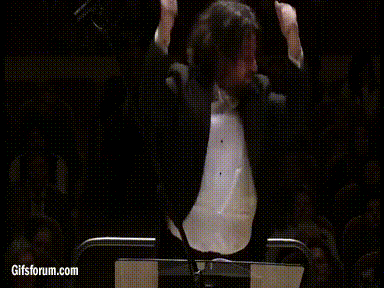
Sometimes you've just gotta head-bang...
185 notes
·
View notes